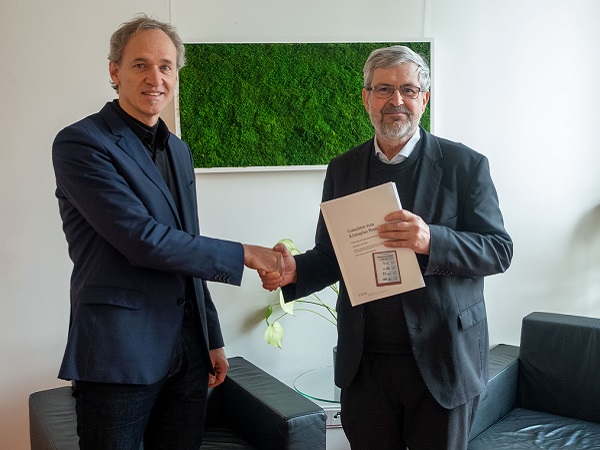Expert opinion for climate plan presented
The scientific director of the expert consortium, Prof. Hirschl, presented the study commissioned by the Ministry of Climate Protection to the Committee for Agriculture, Environment and Climate Protection of the state parliament.
Prof. Bernd Hirschl: "Our scenarios take into account all sectors and the relevant greenhouse gas emissions in context. The report also shows the great pressure for action, because Brandenburg is currently not yet on the path to climate neutrality. Important examples of our recommended measures include not only phasing out coal as quickly as possible, but also reversing the heat and transport systems, converting to a climate-neutral economy, strengthening forests and managing peatlands. What is important is consistent political implementation and control, and also the provision of sufficient financial resources and personnel so that the state and its municipalities can play the urgently needed pioneering role."
"With the expert report, we are entering the final phase in the preparation of the climate plan," said Axel Vogel. "This technical basis will be used to define the measures for the climate plan with which we want to achieve climate neutrality in Brandenburg by 2045." With the measures in the climate plan, the state is to make its contribution to achieving the interim and sector targets for greenhouse gas savings in areas such as agriculture and forestry, energy and industry, transport and construction, which were approved by the cabinet in August 2022. "The report now provides the state government with a thick package of tasks for climate protection. With proposals for over 80 bundles of measures for all eight fields of action of the climate plan, the report shows very clearly where the important tasks for state policy lie on the path to climate neutrality," says Climate Protection Minister Axel Vogel.
The Ministry of Agriculture, Environment and Climate Protection (MLUK) is now discussing measures for the climate plan with all the departments concerned. These are defining their climate-relevant individual strategies and measures for achieving the sector targets. The Energy Strategy 2040, for example, with its focus on expanding renewable energies, forms the basis for achieving a climate-neutral energy supply. Strengthening local public transport is to make an important contribution in the transport sector. In addition, the state administration will act as a role model by setting concrete goals and taking measures to achieve a greenhouse gas-neutral state administration.
"Some things have already been set in motion," said Climate Protection Minister Axel Vogel. "The amendment to Brandenburg's law on the protection of historical monuments, which was approved by the cabinet yesterday, is intended to better reconcile the protection of historical monuments and the expansion of renewables. The planned solar obligation is about the legally required installation of solar systems on roofs in the new construction of commercial and public buildings and parking lots. With the Transformation and Climate Protection Package for Municipalities, we are providing a total of 41.5 million euros for 2023 and 2024 as part of the Brandenburg Package to reduce dependence on fossil energy sources and promote the expansion of renewable energies. There has never been so much funding for municipal climate protection in Brandenburg."
Other measures planned for the climate plan in the department of the Ministry of Agriculture, Environment and Climate Protection (MLUK) include accelerating approval processes for the expansion of renewable energies, converting forests to stable mixed forests and expanding forest areas, and raising water levels on Brandenburg's moorland soils together with the farms that farm there. The transformation process in agriculture toward climate-friendly management is to be promoted, as is advice and support for municipalities on climate protection.
The draft of the climate plan, including measures, will be submitted for consultation as part of an online participation process starting in June before it is introduced to the cabinet in the summer.
Background
In order to achieve the goal of climate neutrality in Brandenburg by 2045 at the latest, the state government is currently developing the climate plan under the leadership of the Climate Protection Ministry. In a national comparison, Brandenburg has adopted very ambitious interim targets for all sectors, including agriculture and forestry, transport and buildings, energy and the economy. In November 2021, the state government had defined seven sectors and eight fields of action for the climate plan. In August 2022, the cabinet adopted the central building block for the climate plan with ambitious interim and sector targets.
Under the leadership of Prof. Bernd Hirschl of the Institute for Ecological Economy Research (IÖW) and the Brandenburg University of Technology Cottbus-Senftenberg (BTU), a team of expert consultants developed the scientific basis and comprehensive recommendations for a climate protection strategy and proposals for a program of measures in Brandenburg between May 2021 and February 2023. These were developed in a broad participation process with stakeholders and the suggestions collected in an online participation. The departments of the state government that were technically involved were closely involved in the development process of the report.
Contact
Management regionaler Energieversorgungsstrukturen
T +49 (0) 3573 85-534
bernd.hirschl(at)b-tu.de

